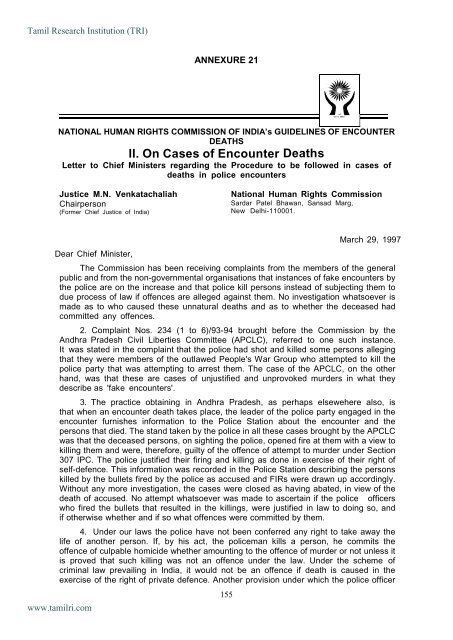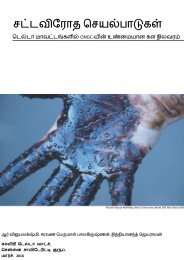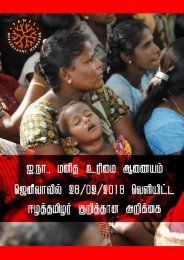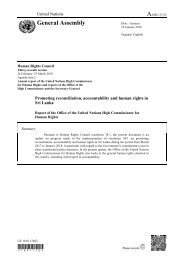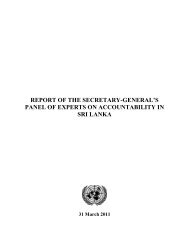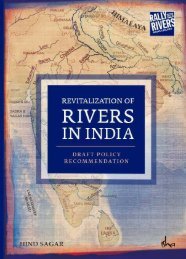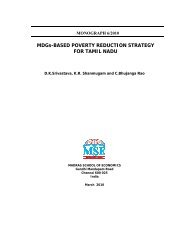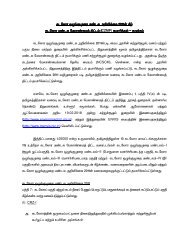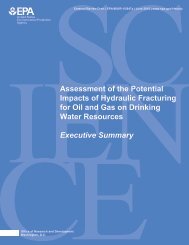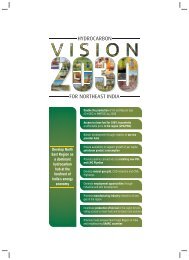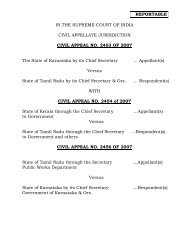Cauvery Basin2
You also want an ePaper? Increase the reach of your titles
YUMPU automatically turns print PDFs into web optimized ePapers that Google loves.
Tamil Research Institution (TRI)<br />
ANNEXURE 21<br />
NATIONAL HUMAN RIGHTS COMMISSION OF INDIA’s GUIDELINES OF ENCOUNTER<br />
DEATHS<br />
II. On Cases of Encounter Deaths<br />
Letter to Chief Ministers regarding the Procedure to be followed in cases of<br />
deaths in police encounters<br />
Justice M.N. Venkatachaliah<br />
Chairperson<br />
(Former Chief Justice of India)<br />
National Human Rights Commission<br />
Sardar Patel Bhawan, Sansad Marg,<br />
New Delhi-110001.<br />
Dear Chief Minister,<br />
155<br />
March 29, 1997<br />
The Commission has been receiving complaints from the members of the general<br />
public and from the non-governmental organisations that instances of fake encounters by<br />
the police are on the increase and that police kill persons instead of subjecting them to<br />
due process of law if offences are alleged against them. No investigation whatsoever is<br />
made as to who caused these unnatural deaths and as to whether the deceased had<br />
committed any offences.<br />
2. Complaint Nos. 234 (1 to 6)/93-94 brought before the Commission by the<br />
Andhra Pradesh Civil Liberties Committee (APCLC), referred to one such instance.<br />
It was stated in the complaint that the police had shot and killed some persons alleging<br />
that they were members of the outlawed People's War Group who attempted to kill the<br />
police party that was attempting to arrest them. The case of the APCLC, on the other<br />
hand, was that these are cases of unjustified and unprovoked murders in what they<br />
describe as 'fake encounters'.<br />
3. The practice obtaining in Andhra Pradesh, as perhaps elsewehere also, is<br />
that when an encounter death takes place, the leader of the police party engaged in the<br />
encounter furnishes information to the Police Station about the encounter and the<br />
persons that died. The stand taken by the police in all these cases brought by the APCLC<br />
was that the deceased persons, on sighting the police, opened fire at them with a view to<br />
killing them and were, therefore, guilty of the offence of attempt to murder under Section<br />
307 IPC. The police justified their firing and killing as done in exercise of their right of<br />
self-defence. This information was recorded in the Police Station describing the persons<br />
killed by the bullets fired by the police as accused and FIRs were drawn up accordingly.<br />
Without any more investigation, the cases were closed as having abated, in view of the<br />
death of accused. No attempt whatsoever was made to ascertain if the police officers<br />
who fired the bullets that resulted in the killings, were justified in law to doing so, and<br />
if otherwise whether and if so what offences were committed by them.<br />
4. Under our laws the police have not been conferred any right to take away the<br />
life of another person. If, by his act, the policeman kills a person, he commits the<br />
offence of culpable homicide whether amounting to the offence of murder or not unless it<br />
is proved that such killing was not an offence under the law. Under the scheme of<br />
criminal law prevailing in India, it would not be an offence if death is caused in the<br />
exercise of the right of private defence. Another provision under which the police officer<br />
www.tamilri.com


